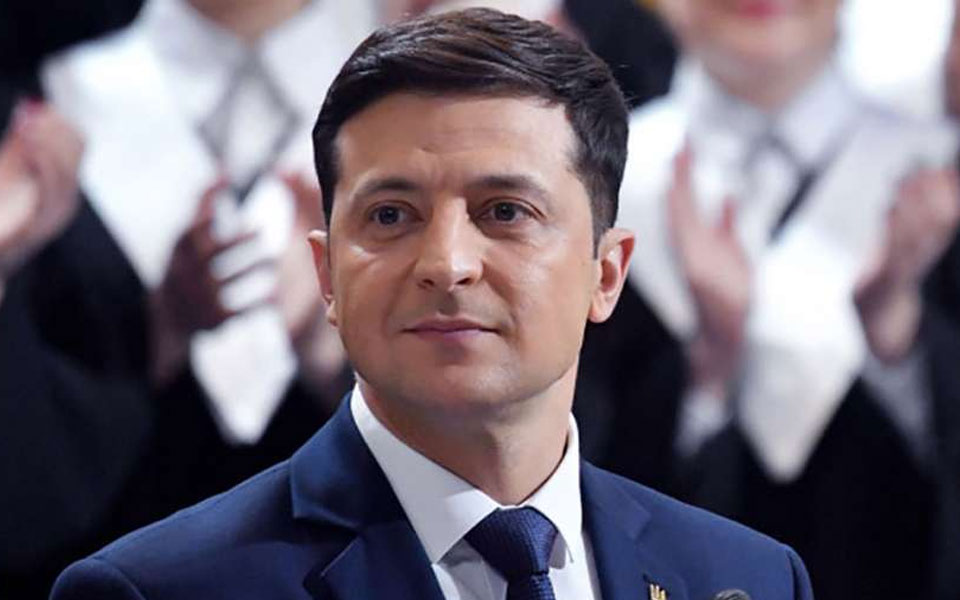Kiev (Ukraine): A comedian with no political experience won a landslide victory in Ukraine's presidential election, drawing congratulations from global leaders while dealing a stunning rebuke to his country's political establishment.
Volodymyr Zelensky, whose only previous political role was playing the president in a TV show, trounced incumbent Petro Poroshenko by taking 73.2 percent of the vote, according to nearly complete official results released early Monday.
Poroshenko garnered just 24.4 percent, losing to the 41-year-old comedian and actor across the country, with 85 percent of ballots counted after Sunday's election.
It was an extraordinary outcome to a campaign that started as a joke but struck a chord with voters frustrated by social injustice, corruption and a war with Russian-backed separatists in eastern Ukraine that has claimed some 13,000 lives.
The star of the TV series "Servant of the People" will now take the helm of a country of 45 million people beset by challenges and having run on the vaguest of political platforms.
"I will never let you down," Zelensky told jubilant supporters at his campaign headquarters where he was showered with glittering confetti.
"I can tell all post-Soviet countries: 'Look at us! Everything is possible!'," he declared.
The remark appeared aimed at neighbouring Russia, where Vladimir Putin has been in power for 20 years and many followed the Ukrainian election with keen interest.
Congratulations poured in from Europe and beyond, with French President Emmanuel Macron and Poland's Andrzej Duda congratulating the Ukrainian president-elect by phone.
"You will now truly be the Servant of the People," said British foreign minister Jeremy Hunt on Twitter, pledging London's support.
NATO Secretary-General Jens Stoltenberg and President of the European Council Donald Tusk said they looked forward to continuing support and cooperation.
"We congratulate President-elect Volodymyr Zelensky," the US embassy in Ukraine said on Twitter.
On the streets of the capital Kiev, some Ukrainians expressed guarded optimism about their new leader.
"Ukraine has passed the democracy test," said Mykola, a 66-year-old pensioner. "I hope it will be the people and not the elite who will live better."
Exit polls showed Zelensky took 87 percent of the vote in eastern Ukraine and defeated Poroshenko even in the west, where the incumbent traditionally enjoyed strong support.
Poroshenko, 53, said the results were clear and enough reason to "call my opponent and congratulate him".
"I will leave office but I want to firmly stress -- I will not quit politics," Poroshenko said in a speech at his campaign headquarters, where supporters clapped, cried and chanted "thank you" to the outgoing leader.
He also appealed to the international community to help safeguard Ukraine's pro-Western course.
"We realise that the Kremlin might be enjoying the election result," he said.
Observers say Ukraine's new leader may seek to use his outsider status to try to improve ties with Moscow. Zelensky said he wanted to "reboot" Western-brokered peace talks that have so far failed to end the conflict.
Moscow said the vote result showed Ukrainians wanted "change".
From Ukrainian-speaking regions in the west of the country to Russian-speaking territories in the war-torn east, many voters said they feared uncertainty but yearned for change.
"We're tired of all the lies," said Marta Semenyuk, 26, who cast her ballot for Zelensky in Kiev.
"I think it just cannot get any worse and I hope he'll live up to his promises," said Larisa, an 18-year-old student from the government-held eastern port city of Mariupol.
Zelensky supporters say only a fresh face can clean up Ukraine's politics and end the separatist conflict.
But others doubt the showman will be able to take on the country's influential oligarchs, negotiate with the likes of German Chancellor Angela Merkel and stand up to Putin.
"People have gone mad," Viktoriya Olomutska, a 39-year-old Poroshenko supporter, said in Kiev. "Cinema and reality are two different things." Poroshenko had previously mocked his rival's lack of political experience, arguing he was unfit to be a wartime commander-in-chief, and the pair traded insults during the campaign.
But on Sunday the two men were respectful, with Poroshenko offering to coach the political novice and Zelensky saying he might seek Poroshenko's advice.
The outgoing leader came to power after a 2014 pro-Western uprising ousted a Kremlin-backed regime, triggering Moscow's annexation of Crimea.
His supporters credited him with rebuilding the army and securing an Orthodox Church independent of Russia.
But many feel the country's ruling elite have forgotten the promises of the revolution. The comic shunned traditional campaign rallies and instead performed comedy gigs and used social media to appeal to voters.
The Ukrainian president has strong powers over defence, security and foreign policy but needs backing from parliament to push through reforms.
Poroshenko's faction has the most seats in the current legislature and new parliamentary polls are due in October.
Let the Truth be known. If you read VB and like VB, please be a VB Supporter and Help us deliver the Truth to one and all.
Dubai: Smoke was seen rising from an area near the United States Consulate in Dubai, according to witness accounts cited by Reuters.
There was no immediate official confirmation on the extent of damage or whether there were any casualties in the incident.
Earlier, the US embassy in Riyadh, Saudi Arabia’s capital, was also attacked. Authorities reported damage to the premises, but no casualties were recorded.
The developments come amid heightened tensions in the region, with Iran continuing to target US interests in the Middle East following deadly attacks launched on Saturday by Israel and the United States.
Near US embassy in Dubai pic.twitter.com/z5VTZNVxNO
— Sahil Shah (@thesahilsshah) March 3, 2026





